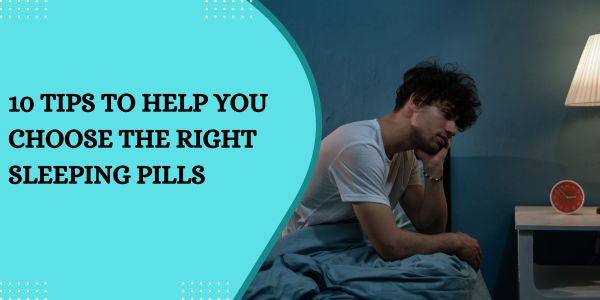
The selection of the right Sleeping Pills is never easy; they tend to be available in a wide range that affects the sleep process distinctively. Whether you are experiencing transient insomnia or even long-term sleeping problems, choosing the proper medication should be a thoughtful process.
10 tips to guide you in selecting proper Sleeping Pills.
1. Consult With Your Physician
Be sure to consult your health professional before you initiate a treatment of any type, including medications likeSleeping Pills. Such specialists can allow you to determine any potential health problem that may be causing your sleep disorder and refer you for proper treatment. Besides, they’ll recommend whether a prescription medication or even an over-the-counter remedy could be sufficient in your case.
2. Consider Prescription Medications
Medications may be necessary for the more serious, or chronic sleep disturbances. The other prescription medication that can be prescribed for this is Halcion, which is a short-acting benzodiazepine sedative-hypnotic used in the treatment of insomnia. This medicine works by depressing the central nervous system so you fall asleep relatively quickly but typically it’s only prescribed for short-term use because it can become habit-forming, and it has various side effects:
3. Drug Interaction Check
It is very necessary to find out if they interact with other drugs you are taking. Some of the sleeping medications can interact with other drugs and cause adverse effects or change the action of a drug, for example, they may interact with other central nervous system depressants to increase their action and raise the risk of serious sedation or respiratory impairment. Ensure you inform your provider about all your current medications and supplements.
4. Learn More About Your Sleep Problem
Various sleeping tablets target different aspects of sleep problems. Thus, it is very important to know your problem in particular:
– In case of poor falling asleep, one needs medication that acts quickly.
– Poor staying asleep probably requires a drug with a long duration of action.
Awakens too early in the day: Medications that help to maintain sleep may be a better option.
Knowledge of the insomnia pattern will help you and your physician adjust the medication for you.
5. Consider an Over-the-Counter Option First
OTC sleep aids are the most common first recommendation. Medications such as melatonin or diphenhydramine could be sufficient in such mild cases. These drugs are usually less potent and less harmful compared with prescription drugs. OTC treatments are good markers for you to decide if a stronger solution is warranted.
Medications may be necessary for the more serious, or chronic sleep disturbances. The other prescription medication that can be prescribed for this medicine, is a short-acting benzodiazepine sedative-hypnotic used in the treatment of insomnia. This medicine works by depressing the central nervous system so you fall asleep relatively quickly but typically it’s only prescribed for short-term use because it can become habit-forming, and it has various side effects:
6. Consider Side Effects
All medications have side effects. The usual side effects of Sleeping Pills are dizziness, daytime drowsiness, and gastrointestinal effects. There are more considerations for prescription sleeping pills when accounting for side effects, such as the risk of tolerance or dependency. Make sure to speak with your doctor about these risks and compare them to the benefits of taking the drug.
7. Consider Natural Alternatives
One may wish to consider natural alternatives first or in addition to prescription treatment. Herbal supplements that promote relaxation and help sleep include valerian root, chamomile, and passionflower. Lifestyle modifications, such as good sleep hygiene, engaging in relaxation techniques, and maintaining a consistent sleep schedule, can be equally effective at managing sleep dysfunction without medications.
8. Assess the Risk of Dependence
One negative effect of taking Sleeping Pills for a long period is dependence. Pills, which are a class of benzodiazepines, can be “taken for an extended period, tolerance may develop, and psychological or physical dependence may occur.” To give individuals such risks, one is advised to use this medication only when seeking short-term relief, and other medications should be sought for long-term treatment of inability to sleep.
9. Know When They Take Effect and Wear Off
Sleeping Pills differ in their time of onset and duration of effect. Some are designed to be fast-acting and work to help one fall asleep faster, while others may serve to help one remain asleep throughout the night. If falling asleep is your problem, a medication with a fast onset might be indicated. If, on the other hand, one does fall asleep but wakes multiple times during the night, one might require a medication with a longer effect. Knowing these aspects may help you to select a drug based on your specific needs.
10. Take Medication as Recommended
The effectiveness of a drug and the minimization of the effects of drug complications occur if the right dosage and usage requirements are followed. For prescription medicine, the doctor should offer directions concerning dosage and length of time for which the drug should be used. Misuse and overuse could bring rise to severe health complications such as tolerance, dependence, and withdrawal symptoms.
Conclusion
Deciding on the sleeping pill should be thoughtful of the situation, specific sleep issues, probable side effects, and risks of dependency. The most sensible thing to do is to consult with a health professional who can help you negotiate all the options and figure out which treatment will work best in your particular case. Whether over-the-counter remedies, prescription drugs like this medicine, or natural options are sought, they are best taken properly and in conjunction with other strategies that help improve one’s sleep regimen. With tips such as these, you are better educated to make a healthier, more restful sleep possible.
Read more blogs: How Corporate Social Responsibility (CSR) Initiatives in Health Impact Business Performance



